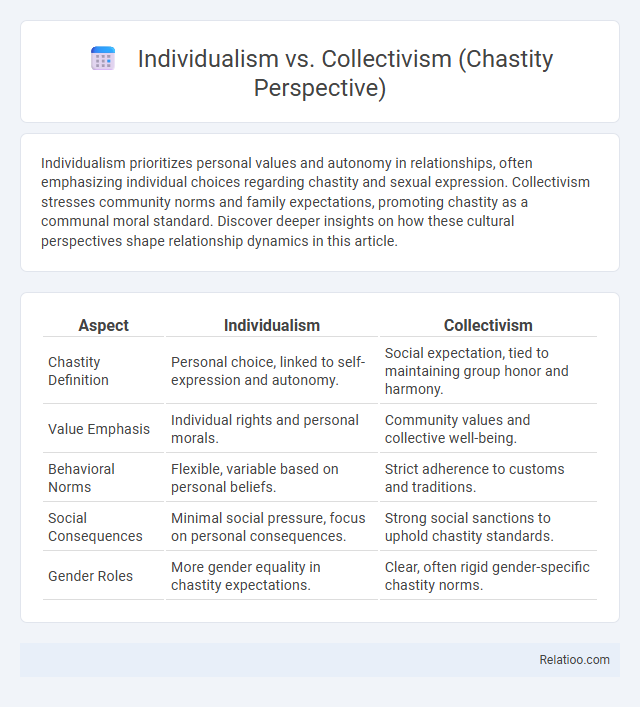Individualism prioritizes personal values and autonomy in relationships, often emphasizing individual choices regarding chastity and sexual expression. Collectivism stresses community norms and family expectations, promoting chastity as a communal moral standard. Discover deeper insights on how these cultural perspectives shape relationship dynamics in this article.
Table of Comparison
| Aspect | Individualism | Collectivism |
|---|---|---|
| Chastity Definition | Personal choice, linked to self-expression and autonomy. | Social expectation, tied to maintaining group honor and harmony. |
| Value Emphasis | Individual rights and personal morals. | Community values and collective well-being. |
| Behavioral Norms | Flexible, variable based on personal beliefs. | Strict adherence to customs and traditions. |
| Social Consequences | Minimal social pressure, focus on personal consequences. | Strong social sanctions to uphold chastity standards. |
| Gender Roles | More gender equality in chastity expectations. | Clear, often rigid gender-specific chastity norms. |
Understanding Individualism and Collectivism: A Brief Overview
Individualism emphasizes personal autonomy and self-expression, often valuing individual chastity as a personal choice linked to self-discipline and moral integrity. Collectivism prioritizes group harmony and social cohesion, viewing chastity as a shared cultural or communal virtue that supports collective well-being and social order. Understanding these perspectives reveals how cultural contexts shape attitudes toward chastity, influencing behaviors, norms, and societal expectations.
Chastity as a Cultural Value: Definitions and Interpretations
Chastity as a cultural value varies significantly between individualistic and collectivist societies, where individualism emphasizes personal autonomy and self-expression, often interpreting chastity as a personal choice linked to individual morals, whereas collectivism prioritizes social harmony and group norms, viewing chastity as a collective responsibility tied to family honor and community reputation. In individualistic cultures, chastity is defined by individual sexual ethics and consent, reflecting personal identity and freedom, while in collectivist cultures, chastity is embedded within cultural traditions, social expectations, and religious doctrines that regulate behavior for the group's benefit. These differing interpretations influence social practices, gender roles, and moral judgments related to chastity, highlighting its role as a dynamic cultural construct shaped by underlying societal values.
Historical Roots of Chastity in Individualistic Societies
Historical roots of chastity in individualistic societies emphasize personal moral responsibility and self-discipline, reflecting core values of autonomy and self-governance. These societies historically promote chastity as a manifestation of individual virtue and integrity, often linked to religious and philosophical traditions like Stoicism and Puritanism. The focus on personal honor and inner moral compass contrasts with collectivist views where chastity is often upheld through communal norms and social expectations.
Collectivist Approaches to Chastity: Social Norms and Expectations
Collectivist cultures emphasize chastity as a social norm tightly linked to group reputation and familial honor, reinforcing conformity through community expectations and shared values. In these societies, individual behavior regarding chastity is often regulated by social sanctions and collective approval rather than personal choice. This collectivist approach prioritizes maintaining social cohesion and preserving cultural traditions surrounding sexual conduct over individual autonomy.
Personal Autonomy vs. Social Responsibility: The Chastity Debate
Individualism emphasizes personal autonomy in chastity, valuing your right to make independent decisions about sexual conduct without external pressures. Collectivism prioritizes social responsibility, advocating chastity as a communal norm that upholds group harmony and moral standards. The debate centers on balancing your freedom with adherence to shared ethical values that maintain societal cohesion.
Gender Roles and Chastity: Individualism and Collectivism Compared
Individualism emphasizes personal autonomy and self-expression in matters of chastity, often challenging traditional gender roles by promoting individual choice over societal expectations. Collectivism prioritizes community values and social harmony, reinforcing chastity as a shared moral standard tied closely to prescribed gender roles and familial honor. Understanding this dynamic helps you navigate how cultural frameworks shape perceptions of chastity and influence gender-specific behaviors.
The Influence of Religion on Chastity Across Cultures
Religious teachings profoundly shape views on chastity, with individualistic cultures often emphasizing personal choice and self-discipline, whereas collectivist societies stress communal expectations and honor. You may find that in collectivist religions, chastity is closely tied to family reputation and social cohesion, while individualistic faiths highlight personal spiritual purity. Understanding these religious influences helps clarify the diverse cultural standards regarding chastity worldwide.
Modern Challenges: Chastity in a Globalized World
Individualism promotes personal autonomy in sexual ethics, often emphasizing self-expression and choice, whereas collectivism prioritizes communal values, including chastity, as a means of social cohesion. In a globalized world, the tension between preserving traditional chastity norms and adapting to diverse cultural influences challenges moral frameworks across societies. Modern challenges include navigating conflicting expectations around chastity amid increased cross-cultural interactions and the digital reshaping of privacy and intimacy boundaries.
Impacts of Social Media on Chastity Values: Individual vs. Collective Views
Social media amplifies the tension between individualism and collectivism in shaping chastity values, where individualistic cultures prioritize personal choice and self-expression, often challenging traditional chastity norms. Collectivist societies emphasize community approval and social harmony, using social media platforms to reinforce collective chastity standards through shared cultural narratives and peer influence. The digital landscape thus influences chastity by either promoting personal autonomy or strengthening group-based moral expectations, depending on the prevailing cultural orientation.
Navigating Chastity: Balancing Personal Beliefs and Community Standards
Navigating chastity requires balancing your personal beliefs with varying community standards shaped by individualism and collectivism. In individualistic cultures, chastity is often viewed as a personal choice reflecting self-control and autonomy, while collectivist societies emphasize chastity as a communal value essential for social harmony and honor. Understanding these perspectives helps you align your convictions with societal expectations without compromising integrity.

Infographic: Individualism vs Collectivism (chastity perspective)
 relatioo.com
relatioo.com